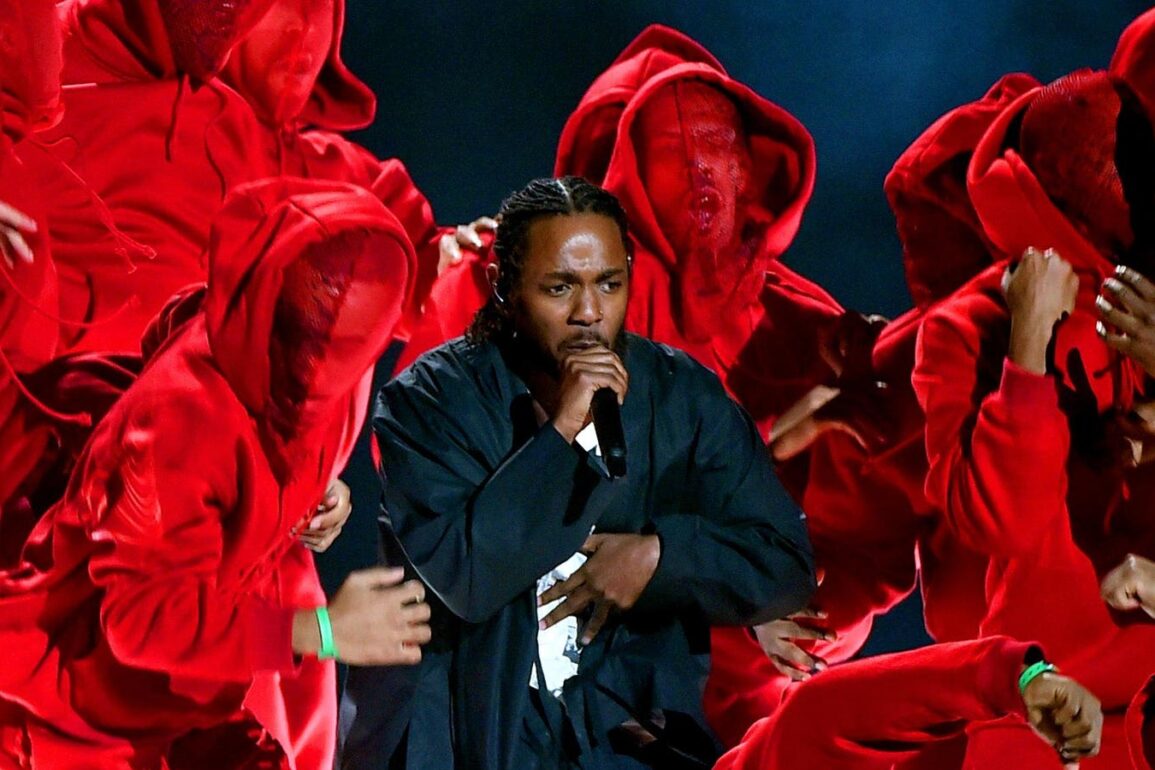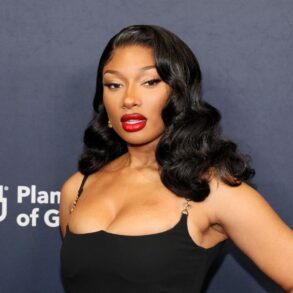
It is not unusual for hip-hop works to secure nominations in primary Grammy categories.
Since the late 1980s, when the “Best Rap Performance” category made its debut, hip-hop has been formally recognized for its undeniable mass appeal by the Recording Academy. This marked the infancy of designated hip-hop categories at the Grammys Awards, acknowledging the genre’s widespread influence on the mainstream cipher. For the 2025 Grammy awards, hip-hop’s presence among the prestigious accolades has steadily evolved, ranging from acknowledging hip-hop pioneers to highlighting elements of the year’s most culturally seismic moments.
Kendrick Lamar Dominates 2025 Hip-Hop Grammy Categories
Kendrick Lamar is up for “Record of the Year” thanks to “Not Like Us,” the track that encapsulated this year’s most culturally seismic event as part of one of the biggest rap feuds of the decade with Drake, who received no Grammy nominations for his singles from the iconic bout. Lamar’s track is vying against Beyoncé’s “TEXAS HOLD ‘EM,” as well as songs by fresh pop sensations Sabrina Carpenter, Charli XCX, Chappell Roan along with Billie Eilish and Taylor Swift. The category is dominated by female artists, with the exception of The Beatles, whose nomination for the resurrected record “Now and Then” has sparked debate. Some argue that this inclusion is unfair to modern acts due the band’s cult-like historic status. This places Lamar, a hip-hop act with mass appeal, in a tense combat against a legacy act and pop culture sensations like Beyoncé and Taylor Swift.
INGLEWOOD, CALIFORNIA – JUNE 19: Kendrick Lamar performs onstage during The Pop Out – Ken & Friends … [+]
Lamar is among the top nominees for the 67th Grammy Awards with seven nominations, a position he shares with Charlie XCX, Billie Eilish, and Post Malone. “Not Like Us” is also nominated for “Song of the Year,” with its music video also contending for “Best Music Video.” In the categories of “Best Rap Performance” and “Best Rap Song,” Lamar holds two spots in both: one for “Not Like Us” and another for his feature on Metro Boomin and Future’s “Like That.” Both tracks are fragments of the season defining Drake vs. Kendrick beef, vying for the prestigious accolade. The catchy diss track has also earned DJ Mustard a nomination for Producer of the Year (Non-Classicial).
Hip-Hop Pioneers and Vets of the 2025 Grammys
The “Album of the Year” category is also dominated by women, a testament to the present phenomenon of female artists in music. While Beyoncé and Swift face off again in this sector, we see André 3000, the legendary Outkast emcee, gaining prestigious gravitas for his first professional foray into a new music genre: jazz. In November 2023, the album, New Blue Sun debuted at the top of the Billboard New Age chart, a feat that can be attributed to both ethusiasts of the jazz genre and the mass curiousity amassed by hip-hop heads. This transition is not far-fetched, as hip-hop and jazz music share a unique bond, evidenced in several classic hip-hop works. This immediate success of André 3000’s jazz debut marks the official infancy of his professional stance as a jazz musician.
Hip-hop veterans Common and Pete Rock have secured nominations for “Best Rap Performance” with their track “When The Sun Shines Again,” featuring De La Soul’s Posdnuos. They face stiff competition from a diverse range of rap talents, including Cardi B’s “Enough (Miami),” Doechii’s “NISSAN ALTIMA,” GloRilla’s “Yeah Glo!,” Eminem’s “Houdini,” Kendrick Lamar’s “Not Like Us,” and Future and Metro Boomin’s “Like That.”
BURBANK, CALIFORNIA – SEPTEMBER 30: Pete Rock and Common appear on “The Jennifer Hudson Show” airing … [+]
The duo’s joint album, The Auditorium, Vol. 1, is also vying for “Best Rap Album,” competing against heavy contenders such as J. Cole’s Might Delete Later.
This Grammy nomination marks a return to the prestigious accolade for both artists. If they win, it would be Pete Rock’s first Grammy since 2012, when he contributed to Kanye West’s My Beautiful Dark Twisted Fantasy, which won “Rap Album of the Year.” Common, a three-time Grammy winner, last won in 2015 for “Glory” from the Selma soundtrack, featuring John Legend, for “Best Song Written for Visual Media.” His previous win was also from a Kanye West collaboration, “Southside,” which won “Best Rap Performance by a Duo or Group” in 2008.
(Original Caption) 3/2/1988- RUN-DMC poses in full regalia that they popularized- heavy gold chains, … [+]
38 years after their first nod, hip-hop pioneers RUN D.M.C. are getting another chance at a competitive Grammy win as their documentary Kings From Queens has been nominated for “Best Music Film.” The iconic duo was honored with Lifetime Achievement Award by the Recording Academy in 2016, but this time they find themselves in the midst of competition. Whether they secure the prestigious accolade or not, the nomination itself is a historic achievement. It signals the potential for hip-hop documentaries and biopics to gain recognition alongside the genre’s classic works, marking a dual triumph for both the group and the culture they helped establish.
While each nomination alone affirms hip-hop’s vitality, a win in either category would set a new standard for the quality of rap the Recording Academy recognizes.
Female Hip-Hop Lyricists of the 2025 Grammy Nods
One must acknowledge the fair embrace of female lyricists. Rapsody has secured nominations for singles from her latest album, Please Don’t Cry, an album sprinkled with a healthy array of collaborations. Her fitting collaboration with Erykah Badu on “3:AM” has been nominated for “Best Melodic Rap Performance,” and in my honest opinion, the North Carolina native deserves the win.
THE TONIGHT SHOW STARRING JIMMY FALLON — Episode 2010 — Pictured: (l-r) Musical guest Rapsody ft. … [+]
The song faces stiff competition from Beyoncé’s “SPAGHETTII,” which samples country music pioneer Linda Martell and features Shaboozey, a song that showcases Bey’s rap skills—a rare occurrence. However, Beyonce is not a rap artist. She is not a hip-hop artist, respectively. Beyoncé’s nomination in this category seems somewhat misaligned. Nevertheless, it’s a historic nomination, potentially granting Martell her first Grammy should they win.
Rapsody’s strongest competition in the category also includes Future and Metro Boomin’s “We Still Don’t Trust You,” another track stemming from the soundtrack of the Kendrick Lamar vs. Drake feud. The key factor here is “melodic,” and Rapsody delivers an euphoric quality in “3:AM,” supported by Badu’s signature soothing rasp and legendary status.
Should Rapsody win, it would mark Badu’s first Grammy win in over two decades, her last being in 2000 for “Best Rap Performance by a Duo or Group” with The Roots on “You Got Me.”
Rapsody has secured an additional nomination for “Best Rap Song” with her track “Asteroids,” featuring three-time Grammy winner Hit-Boy. These nominations bring Rapsody’s total to four Grammy nods, as she still seeks her first win.
ELMONT, NEW YORK – SEPTEMBER 11: (L-R) Katy Perry and Doechii perform on stage during the 2024 MTV … [+]
After a decade of honing her rap artistry, Doechii has entered the realm of prestigious accolades. The self-proclaimed “Swamp Princess” has secured three Grammy nods: “Best Rap Performance” for the lyrically inclined “NISSAN ATLTIMA,” Best New Artist, and Best Rap Album for Alligator Bites Never Heal, her third project under TDE and Capitol records. This marks a breakthrough year for the Florida native, as her distinctive flow shines amid the lexicon of overall modern rap—bringing a new flavor to the sector.
Despite earning Grammy nods with fair performances, Latto’s “Big Mama” and GloRilla’s “Yeah Glo!” are competing against serious industry big dogs. In the “Best Rap Performance” category, Latto is up against legends like Common, Pete Rock, and Eminem, a Kendrick Lamar solo and feature, modern powerhouse Cardi B (who is nominated for her catchy flow filled “Enough (Miami)”—not even an album cut, as Cardi didn’t release an album this year), and game shaker Doechii, who presents formidable competition. In the “Best Rap Song” category, GloRilla, whose “Yeah Glo!” became an internet trend, also contends a double Lamar, the seasoned Rapsody, and Kanye West. West’s star-studded single, “Carnival” with Ty Dolla $ign featuring Rich The Kid & Playboi Carti secured a nomination in the aforementioned category.
Based on metrics, Latto and GloRilla’s nominated singles may not have performed at the level of their fellow contenders. However, their nominations among such heavyweights are accolades in themselves, worthy of appreciation.
Brief Hip-Hop Grammy History
The 31st Annual Grammy Awards in 1989 marked a significant milestone for hip-hop, introducing the first-ever Grammy category for “Best Rap Performance.” This new category recognized quality rap performances from 1988, with nominees including DJ Jazzy Jeff & The Fresh Prince, J. J. Fad, Kool Moe Dee, LL Cool J, and Salt-n-Pepa. DJ Jazzy Jeff & The Fresh Prince won the award, which was presented during a pre-telecast ceremony by Kool Moe Dee. Despite the hip-hop community’s excitement over this recognition, the award faced criticism. Will Smith and Jazzy Jeff boycotted the show due to the award not being televised, while others in the hip-hop community questioned the worthiness of some nominees. This controversy highlighted the ongoing debate about what constituted “quality rap” during hip-hop’s golden era, with emphasis placed on lyrical prowess rather than catchy phrases and choruses.
INGLEWOOD, CALIFORNIA – NOVEMBER 08: Performers such as Doug E. Fresh, Will Smith AKA the Fresh … [+]
At the 33rd Annual Grammy Awards in 1991, the “Best Rap Performance” category was split into two separate awards: Best Rap Solo Performance and Best Rap Performance by a Duo or Group. This decision was made due to the overwhelming number of qualified entries and the Academy’s recognition of diverse rap styles. MC Hammer’s “U Can’t Touch This” won the inaugural “Best Rap Solo Performance” award, sparking controversy in the hip-hop community for its commercial nature. Meanwhile, the Quincy Jones-produced “Back on the Block,” featuring Big Daddy Kane, Ice-T, Kool Moe Dee, Melle Mel & Quincy Jones III, claimed the first “Best Rap Performance by a Duo or Group” award. These categories continued until 2011 and were officially discontinued in 2012.
The Recording Academy and Proper Hip-Hop Inclusion
The Recording Academy’s inclusion of quality hip-hop is showing slow but steady progress, though there is still work to be done. Notable artists in the likes of Nicki Minaj, Drake, Megan the Stallion are absent from this year’s nominations. Despite Drake’s previous withdrawal of nominations in 2022, his absence this year might be attributed to the potentially embarrassing factor behind his 2024 releases: his defeat in the recent historic Kendrick Lamar feud. The aforementioned is a theory. Similarly, while Megan and Minaj’s drops in the past year were largely centered around their own beefs and garnered commercial success, they were overlooked for nominations.
However, as evidenced by Kendrick Lamar’s nominations, the acknowledgement of an hip-hop artist’s lyrical dexterity amid controversy (rap beef), which is highly valued by enthusiasts, should not preclude consideration for these prestigious accolades.
This post was originally published on this site be sure to check out more of their content.









